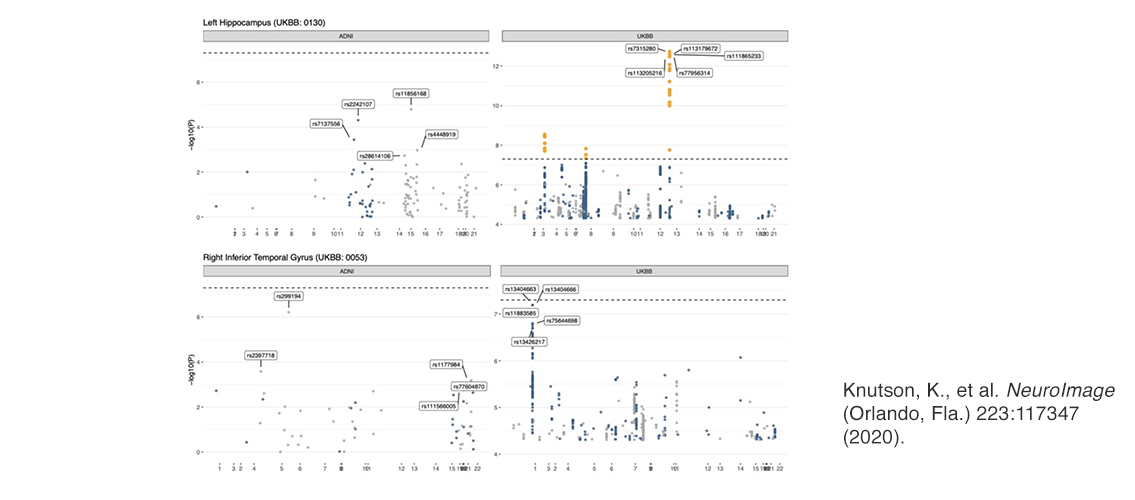
Genome-wide association studies (GWAS) have identified thousands of genetic variants associated with Alzheimer’s Disease (AD). Limitations to GWAS, however, have encouraged researchers to look for methods of improving their power and interpretability. Two methods that aggregate contributions from one or multiple genetic variants can be used to investigate the role of genetically regulated causal endophenotypes in complex traits. These methods include Mendelian Randomization and the Imaging Wide Association Study (IWAS).
Dr. Katherine Alex Knutson worked on a project called “Multimodal Brain Imaging Phenotypes Causally Associated With Alzheimer’s Disease” as a 2020 UMII MnDRIVE PhD Graduate Assistant (this program is now called the RC-MnDRIVE PhD Graduate Assistantship Program). This project developed novel extensions to the IWAS framework to account for key biological factors which may impact model performance in practice, namely 1) genetic pleiotropy and 2) population substructure. The proposed approach in a paper appearing in NeuroImage (see below) successfully identified a number of well-established AD-associated brain ROIs, including the left hippocampus and right inferior temporal cortex volumes, and others which remained undetected using existing causal inference methods. Further work identified genes whose expression has varied effects on complex traits between ancestral groups, including Alzheimer’s Disease and related imaging derived phenotypes and appears in Human Molecular Genetics (see below).
Dr. Knutson is a member of the MSI research group of MSI PI Wei Pan (professor, Biostatistics; Masonic Cancer Center) and used MSI resources for this project. She was awarded her PhD in 2021.
The RC-MnDRIVE PhD Graduate Assistantship program supports UMN PhD candidates pursuing research at the intersection of informatics and any of the five MnDRIVE areas:
- Robotics
- Global Food
- Environment
- Brain Conditions
- Cancer Clinical Trials
This project is part of the Brain Conditions MnDRIVE area.
Publications resulting from this work include:
- Knutson, K., Deng, Y., Pan, W. Implicating causal brain imaging endophenotypes in Alzheimer’s disease using multivariable IWAS and GWAS summary data. NeuroImage (Orlando, Fla.) 223:117347 (2020)
- Knutson, K.A., Pan, W. MATS: A novel multi-ancestry transcriptome-wide association study to account for heterogeneity in the effects of cis-regulated gene expression on complex traits. Human Molecular Genetics, ddac247 (2022). doi: 10.1093/hmg/ddac247
Posters, Presentations, and Talks:
- Conference Flash Talk, Advanced Computational Neuroscience Network, Virtual, September 20, 2021, “Implicating Causal Brain Endophenotypes in Alzheimer’s Disease”
- Finalist for International Genetic Epidemiology Society 2021 Neel Award and Platform Presentation IGES 2021 Conference Presentation (October 2021)
- American Society of Human Genetics 2021 Virtual Meeting, Reviewers’ Choice poster award and Poster Talk session (October 2021)
Image description: Manhattan Plots reflecting genetic architecture for two significant endophenotypes in Alzheimer’s Disease, the left hippocampus and right inferior temporal cortex volumes, compared between two sources of data, the Alzheimer’s Disease Neuroimaging Initiative (ADNI) and the UK Biobank (UKBB). Image and description from Knutson, K., et al. NeuroImage (Orlando, Fla.) 223:117347 (2020).
posted on April 19, 2023